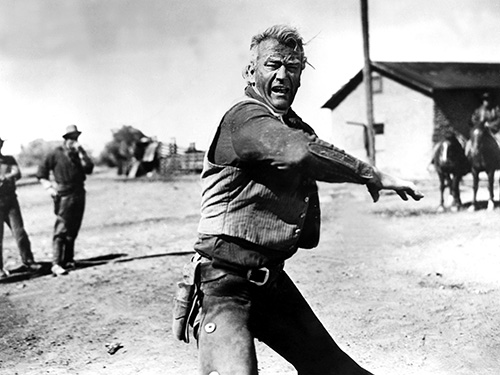
“There is a constant illusion that you are watching an extraordinary effort to get cattle across a certain immense expanse of difficult and threatening country, that you are learning a lot about how such a job feels and gets done, and that the perpetually wrangling players are important not so much of themselves, but because the whole success or failure of the attempt depends on these people. The attempt is really the story, and the ‘background’ is really the hero of the piece, and its villain.
Hawks obviously likes and understands men, grand enterprise, hardship, courage and magnificent landscape. The greatest satisfaction of this picture is continuous and unobtrusive. It is the constancy with which all outdoors, and all human endurance of it and effort to conquer it, keeps bulging the screen full of honest and beautiful vitality, like a steady wind against a well-trimmed sail.”
James Agee1
“We didn’t see that Hitchcock, Hawks were old. So we’d say: ‘they’re going to make their last film, which is going to be as beautiful as Beethoven’s last quartets or the Titian’s last paintings.’ We admired old people. It was a slightly strange period. And we were certain that they were, of course, enchanted to see us. So actually it was still a period when the studio system was still there. Each had its Foreign Press department where there’d be someone saying: ‘Listen, there are two completely weird people who’ve just arrived from the Cahiers du Cinéma.’ It had made its way to Hollywood that there was an impossible group of French who had twisted tastes and who preferred Samuel Fuller to Robert Wise – which of course they were right to, but at the time it was scandalous. So the Americans did their job, they’d say, ‘No skin off our back’. They had the means to ask this or that filmmaker if he would kindly receive two young French journalists for an hour. Everybody said yes. So that we ended up all proud, with our completely misplaced questions, completely intellectual, completely foundational, seeing Howard Hawks. Hawks was the guy who had made Rio Bravo, it was the first film I’d written about and it’s stayed an essential film all my life. It’s a film I could talk about for hours because that film has accompanied me. There is a film that looked at me, which saw me as I was, I, as a teenager, and which knew a lot about me, much more than I thought I knew about it. So Howard Hawks was for me my favorite filmmaker.”
Serge Daney2
While Red River can be considered a boys’ own rites-of-passage there are key moments that escape, or lie outside of, what has been conservatively defined as masculine. Some of these revolve around the two key women, and the film appears to acknowledge something significant that it cannot say. The first is at the beginning, when Tom tells Fen that it is ‘too much for a woman.’ Rather than offer an argument, she simply invites him to hold her, suggesting and offering her body as proof in place of words. Tom doesn’t ‘get it’ and the cost of this is not so much extreme as despairing. A similar moment occurs when the cattle drive gets under way, the film almost stopping for a series of extraordinary close-ups of cowboys yelling and hollering. It is a point of great narrative import (the struggle begins) but rather than articulate this the film slides into inarticulate sound and music. Finally, Tess’ presence at the film’s end reveals that while the men haven’t understood their own battle, she has all along. While Matt and Tom fight they collapse into a shop cart, pointedly containing home-wares and haberdashery. The gun Tess draws on them she mockingly declares unable to use (after already firing it and wounding Tom) because it ‘isn’t mine, it’s his’, throwing it back to its ‘rightful’ owner.
This is the strength of genre: the variations and nuances an informed genre piece contains produce the small fragment, the subset, that reverberates through the larger set of the film, the oeuvre, and the genre. This is what Hawks does extremely well, and Red River is one of his best examples.
Adrian Miles3
- 1James Agee, “Cinema: The New Pictures,” Times, 11 October 1948.
- 2Serge Daney, “Journey of a Cine-Son - Part 1 (with transcript)”.
- 3Adrian Miles, “Red River,” Senses of Cinema, February 2001.

